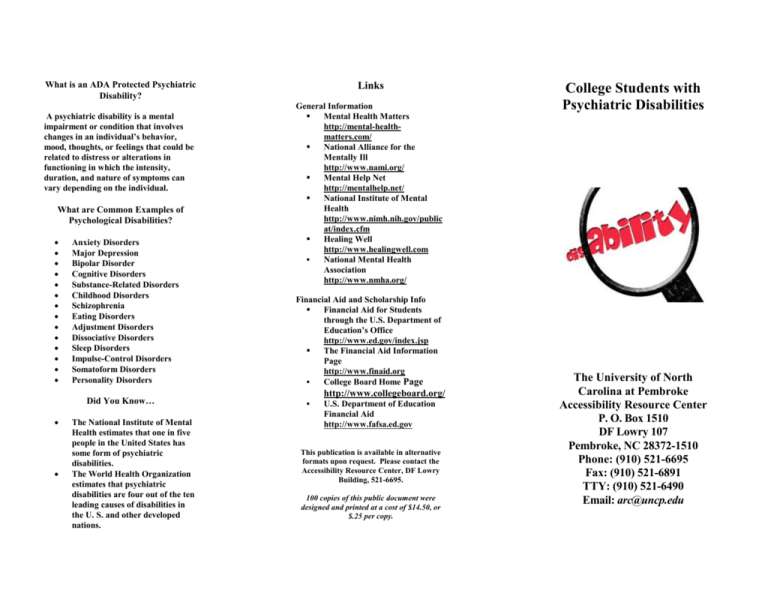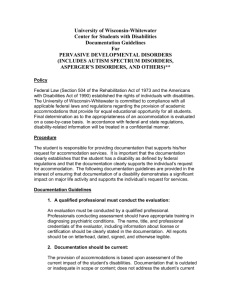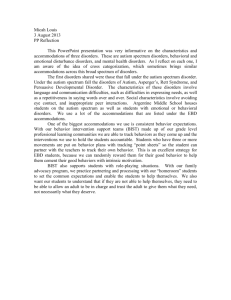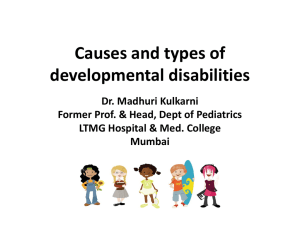Psychiatric Disability - The University of North Carolina at Pembroke
advertisement

What is an ADA Protected Psychiatric Disability? A psychiatric disability is a mental impairment or condition that involves changes in an individual’s behavior, mood, thoughts, or feelings that could be related to distress or alterations in functioning in which the intensity, duration, and nature of symptoms can vary depending on the individual. What are Common Examples of Psychological Disabilities? Anxiety Disorders Major Depression Bipolar Disorder Cognitive Disorders Substance-Related Disorders Childhood Disorders Schizophrenia Eating Disorders Adjustment Disorders Dissociative Disorders Sleep Disorders Impulse-Control Disorders Somatoform Disorders Personality Disorders Did You Know… The National Institute of Mental Health estimates that one in five people in the United States has some form of psychiatric disabilities. The World Health Organization estimates that psychiatric disabilities are four out of the ten leading causes of disabilities in the U. S. and other developed nations. Links General Information Mental Health Matters http://mental-healthmatters.com/ National Alliance for the Mentally Ill http://www.nami.org/ Mental Help Net http://mentalhelp.net/ National Institute of Mental Health http://www.nimh.nih.gov/public at/index.cfm Healing Well http://www.healingwell.com National Mental Health Association http://www.nmha.org/ Financial Aid and Scholarship Info Financial Aid for Students through the U.S. Department of Education’s Office http://www.ed.gov/index.jsp The Financial Aid Information Page http://www.finaid.org College Board Home Page http://www.collegeboard.org/ U.S. Department of Education Financial Aid http://www.fafsa.ed.gov This publication is available in alternative formats upon request. Please contact the Accessibility Resource Center, DF Lowry Building, 521-6695. 100 copies of this public document were designed and printed at a cost of $14.50, or $.25 per copy. College Students with Psychiatric Disabilities The University of North Carolina at Pembroke Accessibility Resource Center P. O. Box 1510 DF Lowry 107 Pembroke, NC 28372-1510 Phone: (910) 521-6695 Fax: (910) 521-6891 TTY: (910) 521-6490 Email: arc@uncp.edu What are the Documentation Guidelines? Students who are requesting support services from the Accessibility Resource Center at the University of North Carolina at Pembroke are required to submit documentation to verify eligibility under the ADA of 1990. The following guidelines are provided in the interest of ensuring that the documentation is complete and appropriate. In the state of North Carolina the diagnosis must be done by a licensed mental health professional such as a psychologist or a psychiatrist and must include the license number. The diagnostician must be an impartial individual who is not a family member of the student. A psychiatrist is preferred, and required, if medication is involved. 1. A clear statement of the disorder, including DSM-IV diagnosis and a summary of present symptoms. 2. Documentation for eligibility should be current, preferably within the last six months. 3. A summary of assessment procedures and evaluation instruments used to make the diagnosis and a summary of the evaluation results, including standardized or percentile scores should be included. 4. 5. Medical information relating to the student needs to include the impact of medication on the student's ability to meet the demands of the post-secondary environment. A statement of the functional impact or limitations of the disorder on learning or other major life activity and the degree to which it impacts the individual in the learning context for which accommodations are being requested. How are Accommodations and Support Services Determined? After receiving the diagnostic evaluation or report, ARC staff will review the need for accommodations and support services based on the individual's disability documentation and disability-based need. ARC staff will notify the student after determining appropriate accommodations in accordance with Section 504 of the 1973 Rehabilitation Act, the 1990 Americans with Disabilities Act and university policy. As of January 2009, ARC is adhering to the Americans with Disabilities Act Amendment Act (ADAAA). What are the Typical Accommodations? Tape recorders Voice activated software Flexible attendance, if possible Priority registration, if appropriate Separate testing room Note takers Alternative testing Electronic textbooks These accommodations are not automatic. Each student must qualify for each accommodation. Assistive Technology at UNC Pembroke Premier Assistive Technology Software Zoomtext Dragon Naturally Speaking Kurzweil JAWS Inspiration General Resources National Organizations National Mental Health Association 1-800-969-NMHA (6642) National Alliance for the Mentally Ill 1-800-950-NAMI (6264) National Institute of Mental Health 1-866-615-NIMH (6464) Substance Abuse and Mental Health Services Administration (SAMHSA) National Mental Health Information Center 1-800 789-2647 Tips for Successful College Experience Prioritize and plan the use of your time. Have regular work and sleep schedules. Participate in extracurricular, social, or campus activities. Try to do something nice for yourself. Relax and schedule time for things that you enjoy. Take time for yourself each day. Try exercise daily. Learn or try something new or exciting. Maintain a balance between personal, social, work-related, and academic activities. Use resources available to you when needed. Appreciate your abilities and accept who you are.








